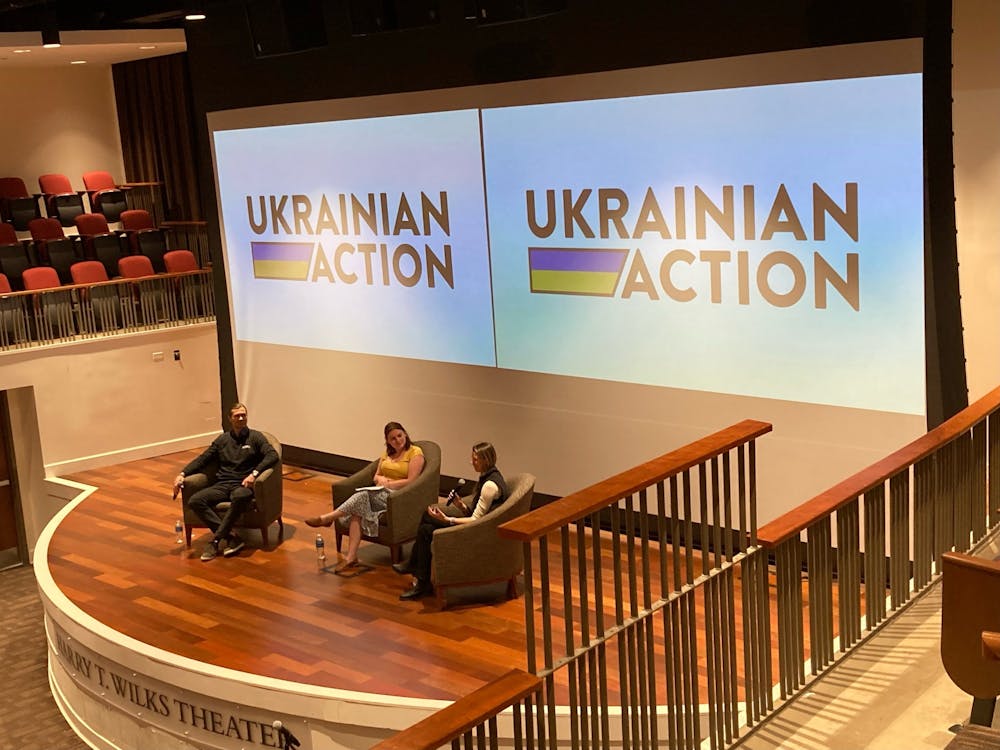On March 10, 2022, the first truck of 153 left London on a trailblazing path to Ukraine. The bed was full of hand-picked supplies for Ukrainians in need.
That trip was one of 32 and counting.
In the driver’s seat was Jeffrey Hartman, a Miami University alumnus and Ohio native. Hartman graduated in 2001 with degrees in international business and marketing.
But that’s not what led him to the driver’s seat of a single pickup truck hellbent for Ukraine.
After college, Hartman joined The Peace Corps and was sent to Ukraine to teach business for two years. Those two years, combined with another year living in the country, created friendships that turned into partnerships after the Russian invasion of Ukraine.
“Three years traveling the country and speaking to people understanding some of the nuances, all of that is fundamental to understanding how to assist that country in wartime,” Hartman said.
Less than a month after the invasion, Hartman and his wife Natasha arrived at the idea of transporting goods to those in need. A friend of theirs created a GoFundMe donation page to buy the first pickup truck. This led into the creation of Ukrainian Action, a nonprofit organization that delivers goods to Ukrainians affected by the war.
They have now raised $1.8 million and have sent 153 truckloads to Ukraine, according to their website.
“Initially, it was just to address what at the time was a short-term need, and then it expanded, and we have diversified the activities as well because we have become aware of other needs, through our experiences there and communicating with people,” Jeffrey Hartman said.
The Hartmans knew where to send the supplies and what to deliver because of connections they made 20 years ago.
“I spoke to people in Ukraine and said to them, ‘What do you need?’” Jeffrey Hartman said. “They told me what they needed, and it was clear that I could buy them where I was living in the U.K. So I bought them and drove them there.”
The ever-changing nature of living in a warring country has created a fluid list of items that are being asked for.
Enjoy what you're reading?
Signup for our newsletter
The list extends past food and personal protective equipment and into everyday housing needs to keep life as normal and safe as possible for citizens. One of the largest programs that the organization has focused on is replacing windows in housing buildings.
“We thought that the windows project was really interesting, because it helps emergency relief and infrastructure support,” Natasha Hartman said. “It came to us through a contact that we know and trust. Knowing that person and having that trust is extremely important, particularly when you're working in an environment where there's a war going on.”
Getting windows to protect civilians from the weather and the elements of war deemed more complex than first thought. The program was delayed because of the difficulty of finding windows to replace whole apartment complexes.
“We needed to make sure that the money that we were receiving and the money that we were spending was accountable to our donors,” Natasha Hartman said. “We were receiving weekly reports and that was really important to know what was happening.”
The couple visited Miami on April 17 and presented a lecture as part of the Menard Family Center for Democracy's Dialogues on Democracy series. The lecture was based around what individuals can do to help a cause like Ukrainians in need.
Despite the beneficial aid the couple is supplying to Ukraine, Greyton Manne, a sophomore games and simulation major that attended the lecture, believes there are challenges to students getting involved in the organization.
“I do think that some students will get involved,” Manne said. “That being said, a lot of us don’t have the money to support them because we’re in college. I think later on, students will support them.”
When asked what people can do to help if they can’t volunteer to drive to Ukraine, the Hartmans were quick to explain how much every dollar can help.
“Individual donations are still paramount for us to conduct our activities,” Jeffrey Hartman said. “Whilst it might not seem like much, 20 bucks can make a big difference by providing a solar power bank that will enable a student to study online in Ukraine because his school was either destroyed or isn't operating because they don't have a bomb shelter.”




